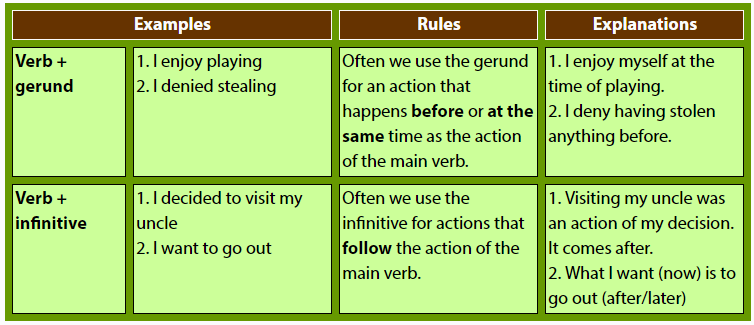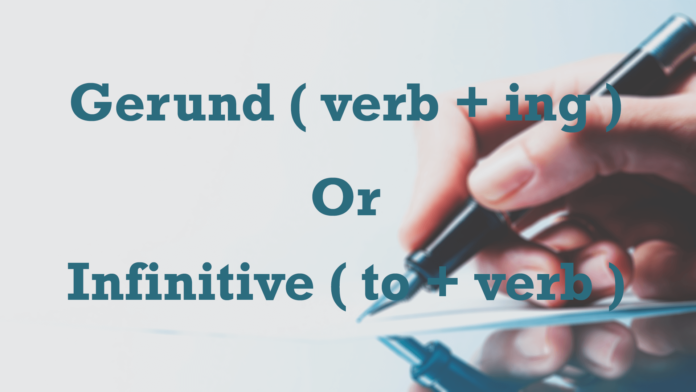Gerund and Infinitive in English may seem like an invincible barrier for many as to what to use in a particular situation, having that common headache “Come on, is it an infinitive or gerund?”. You know what I mean.
However, that’s no longer a problem. Just rest reassured because hopefully this guide clears up all of the confusion. So, make sure to scroll down to the very end.
Gerund and Infinitive Forms
“Gerund” is the present participle form of the verb which is basically a verb followed by “ing”. For example: having, doing, learning. A gerund is a verbal noun. So, you should not confuse gerund with finite verbs. Don’t worry, we’ll break this down later.
“Infinitive” is more like the base unchanged-yet form of the verb preceded by “To”.
It’s equally important to draw a distinction between infinitive and bare infinitive.
Bare infinitive is the infinitive itself without “To” at the beginning.
Examples:
- Have(bare infinitive) => To have(infinitive)
- Do => To do
- Learn => To learn
Gerund and Infinitive Use
-
-
Generally Speaking
Infinitive and Gerund can both stand out as a noun. Some verbs can be followed by either an infinitive or a gerund sometimes keeping the same meaning other times having different meanings.
Verbs followed by infinitive or gerund begin – continue – hate – like – love – neglect –
prefer – start – tryExample:
- Her goal is to win.
- What John dislikes is repeating himself.
-
-
Bonus Tip
There is a way that you can make use of to reason out whether you are supposed to use gerund or infinitive. It works perfectly most of the time.

-
Bare Infinitive with Modal Verbs
They are always followed by bare infinitive.
Modal Verbs can – could – may – might – will – would – shall – should – must – dare – ought to – have to – had better – need not Example:
- Imad can speak three languages fluently.
- Everyone should stay at home.
- You have to contribute to the common good.
-
Gerund
- First, we use gerund after prepositions (e.g., in, out, up, down, about, with, on… etc.) and verbs with prepositions (e.g., apologize for, ask about, argue about/against, approve of, decide on, blame for, consist of… etc.).
The gerund here functions as an object of a preposition.Example:
- Thomas left for work without having breakfast.
- There is a chance of catching cold these days.
- They decided on moving to London.
- YouTube approves of promoting mediocrity.
- Since it behaves as a noun, we can use gerund as the subject of a sentence. It is always singular. So, make sure that the verb that follows accords with third-person singular conjugation.
Example:
- Reading books has its rewards.
- Smoking causes lung cancer.
- Cooking is the fad during the confinement against COVID19.
- It can also function as a subject complement in a sentence, disclosing more information about the subject.
Note: Subject complement is not an object and that’s because it is not the resulting action of the subject/doer, instead it gives more information about the subject. A subject complement always comes after a linking verb (e.g., am, is, are, was, were, appear, become, feel, will be, remain, seem, taste,…etc.).Example:
- John’s favorite activity is complaining.
- A serious challenge to graduates is waiting to be employed.
- Watching anime remains amusing.
- Staying at home became tiring and exhausting.
- A gerund functions as an object of a possessive pronoun when following a possessive pronoun( e.g., my,your, his, her, its, our, their, ‘s ). Many including native speakers mistake possessive pronoun for object pronoun when intending to output gerund after them.
Example:
- Me crying changed his mood upside down. × incorrect
- My crying changed his mood upside down. √ correct
- She doesn’t like you bossing her around. × incorrect
- She doesn’t like your bossing her around. √ correct
- Richard appreciated Mohamed helping him with his online courses. × incorrect
- Richard appreciated Mohamed‘s helping him with his online courses. √ correct
- It can also act as an object complement situated right after the object although this is scarcely used and not common. This is possible only with few verbs like find, call, catch, consider….etc.
Example:
- Thomas considers her being rude unusual.
- The teacher considers tardiness being more than five minutes late for class.
- Ahmed caught his wife cheating on him.
- Monkey D Luffy sent Kaido flying.
- I find the idea interesting.
- Finally, gerund can function as the object of a sentence. It’s very important to know that there are certain verbs that gerund comes after.
Verbs followed by gerund ( verb + ing ) admit – adore – anticipate – appreciate – avoid –
celebrate – confess – stand – delay – deny – detest –
discuss – dislike – enjoy – finish – imagine – keep –
justify -mention – mind – miss -bear – postpone –
practise- quit – recommend – regret – report – resume
– risk – suggest – tolerate – understand – can’t help –
resistExample:
- She admitted destroying the tea glasses.
- People avoid buying unnecessary things during this crisis.
- I can’t help eating junk food.
- Rahma enjoys learning computer languages.
- First, we use gerund after prepositions (e.g., in, out, up, down, about, with, on… etc.) and verbs with prepositions (e.g., apologize for, ask about, argue about/against, approve of, decide on, blame for, consist of… etc.).
-
Infinitive
- Infinitive can come right after an adjective and act as the adjective complement.
Example:
- It is nice to see you.
- The conflict was easy to resolve.
- Moroccans were happy to declare their independence.
- Sophia and her husband were ready to purchase a car.
- Citizens are eager to go out.
- It can act as an adjective following the noun it describes.
Example:
- It is about time to sleep.
- It is time to take a break.
- There are many opportunities to take.
- It’s a high time to abide by the safety measures.
- Besides, it can function as the subject of a sentence preceding the verb.
-
Example:
- To procrastinate worsens your productivity.
- To wait seemed unwise when a decisive action was required.
- To swim in that sea can be dangerous.
- Infinitive can also function as a subject complement in a sentence, disclosing more information about the subject. and that’s when it is preceded by a linking verb.
Example:
- My goal is to get good grades.
- His desire has been to enter graduate school.
- Her job last summer was to answer the phone.
- Finally, infinitive can also act as the object of a sentence. It’s very important to know that there are certain verbs that infinitive comes after.
Verbs followed by infinitive ( to+ verb ) afford – agree – appear – arrange – ask – wish – attempt – care – choose – claim – decide – demand – deserve – determine – want – expect – fail – get – guarantee – hate – help – hesitate – hope – hurry – intend – learn – manage – mean – need – offer – plan – prepare – pretend – promise – refuse – seem – tend – threaten – would like Example:
- I like to write in English.
- Everyone wanted to go.
- The coach taught him to hit a curve ball.
- Infinitive can come right after an adjective and act as the adjective complement.
I hope you enjoyed the guide. if you did, share it to reach and clear the confusion of many.
You may also check How to Answer Reading Comprehension Questions






Quality content (y) the explanation is made clear thanks to the number of succinct examples. I can tell for sure that the writer has done enough research prior to drafting this lesson. Keep up the good work!
Hi nice website.
cool! Thanks